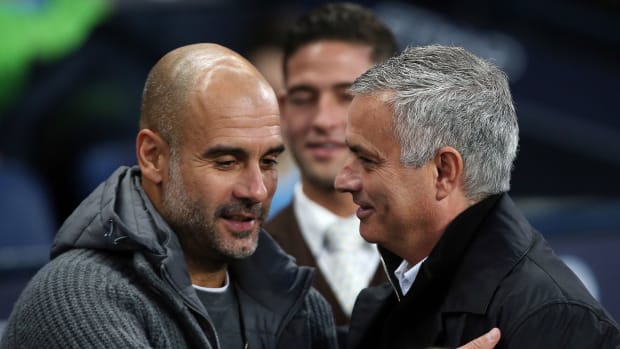New on Sports Illustrated: Pep Guardiola vs. Jose Mourinho Feud a Fraction of What it Once Was
There's a sense of anti-climax as the managers square off again, with one of their ideas hailed as the present and future, and the other's a relic of the past.
Pep Guardiola vs. Jose Mourinho.
For almost a decade, it was a rivalry that defined football: possession against anti-possession; beauty against expediency–or sanctimony against pragmatism depending which side of the line you stood; two men who, for two years in Spain, were part of perhaps the most bitter and compelling soap opera the sport has known. And yet when they meet on Sunday as Tottenham hosts Manchester City, there will be an inevitable sense of anti-climax. This isn’t the sport's biggest battle anymore.
On the one hand, that’s because Mourinho is now the manager of Tottenham Hotspur, whose wage bill is roughly 57% that of Man City. It’s true Tottenham has been an awkward opponent for Man City of late, drawing 2-2 at the Etihad in August and eliminating Man City from last season’s Champions League, but both occasions featured a late Man City goal ruled out by marginal VAR decisions and would have been slightly freakish anyway. Besides which, this Tottenham is not that Tottenham, with both the spirit that sustained it and its manager, Mauricio Pochettino, gone.
Tottenham's league form has improved some since Mourinho replaced Pochettino in November, but it has been limited, particularly after an initial surge that brought four wins in five games. Mourinho’s 17 games in charge have yielded just two clean sheets, while Spurs have scored only 10 goals in their last 10 matches.
Mourinho’s job has been hampered by a number of key injuries, most notably to Harry Kane, whose absence leaves Tottenham without the sort of back-to-goal striker Mourinho’s increasingly direct football requires. Even with City essentially just ticking over on the league with nothing much to play for, with the club
19 points behind Liverpool, it would be regarded as an achievement were Tottenham to get anything from the game.
That's not to say that Mourinho is incapable of pulling it off. On the contrary, this is just the sort of situation in which he used to thrive. Perhaps he can spoil his way to nicking a late winner. But what is perhaps most damning is the sense that even if he did, it wouldn’t really mean anything. In the aftermath of Inter Milan’s victory over Barcelona in the 2010 Champions League semifinal, Mourinho seemed to be the anti-Guardiola–just as he had set himself up to be after Guardiola had gotten the Barcelona job ahead of him in 2008.
If Guardiola wanted his side to dominate the ball, then Mourinho's would play without it. Inter had just 19% possession in the second leg of that semifinal. When Mourinho was appointed coach of Real Madrid, it was to bring Guardiola down. Eventually, in his second season, he did that, as Madrid won the league and Guardiola left Barcelona. But in his first season, 2010-11, Barcelona won both the league and the Champions League, playing extraordinary football. The war was won then, and it’s Guardiola’s ideas that have prevailed since.
The rekindling of that rivalry in Manchester never fully took flight, in part because of United’s limitations, but also because Mourinho just seemed so old-fashioned. Whereas Guardiola, like Jurgen Klopp, organizes his side to construct his attacks, Mourinho believes in instilling within them the right mindset to enable them to improvise as appropriate.
The evidence of the past few years suggests that while that may allow a defensively stable team to be more effective on the counterattack, it is ineffective for breaking down deep-lying defenses. Guardiola remains a central part of the present, but Mourinho already seems part of the past. Everybody presses high now, but not Mourinho, not often.
This is problematic for Mourinho. Perhaps he can enjoy a renaissance at Tottenham. With its historical lack of success, it is the sort of outsider he has been able to energize before. But under Pochettino, there was a youth and vibrancy to Spurs, a sense at least of a team that enjoyed playing together and was prepared to accept a little less money because of the positivity of the environment. Perhaps if the club hadn’t had to redevelop its stadium, if it had possessed the capital to improve players' contracts and refresh the squad–prior to the most recent two transfer windows–that sense of forward motion could have been preserved.
But to have to reset and build again is difficult, and all the more so under a manager whose last three jobs have had little to do with inspiring a side to ascend to new heights. Maybe he can turn back the clock, but it’s hard to avoid the sense that football has already moved on and left Mourinho behind.

Comments
Post a Comment